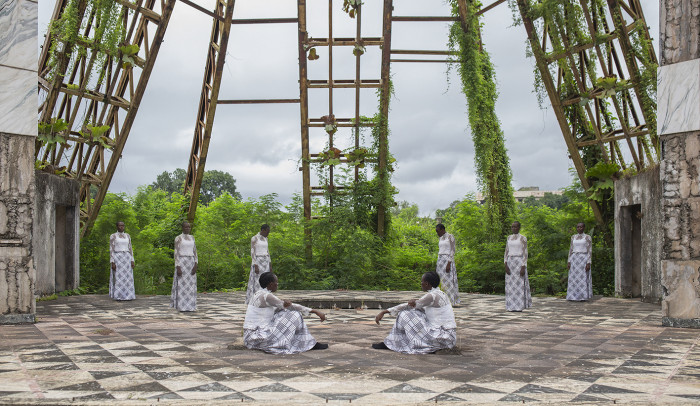Gosette Lubondo
Gosette Lubondo graduated from the Kinshasa Academy of Fine Arts in 2014. She graduated with her first photographic work entitled Au fil du temps, devoted to the remnants of Kinshasa's abandoned transport infrastructure. In 2016, she created Imaginary Trip, a series of photographs based on a disused train at Kinshasa station, where she staged imaginary journeys and re-enactments. Imaginary Trip II is a new "imaginary journey” set in a school founded in 1936 in Gombe-Matadi in the southwest of the country, then colonised by Belgium, which has now fallen into disuse. Lubondo's aim is to shed new light on the history of the site and its contemporary significance, and in so doing continue her work of remembrance. From 2017 to 2019, she created the Tala Ngai series (which means "Look at me" or "Pay me a visit" in Lingala), made up of triptychs showing young Kinshasa women in their domestic clothes, then in public clothes, accompanied by a third shot showing a part of their domestic interior.
Her work has been shown at the Kampala Biennial in Uganda in 2016, at the Congo in Harlem Film Festival in New York (2019); at the Musée du Quai Branly as part of the group exhibition A toi appartient le regard et (...) la liaison infinie entre les choses (2020); at AKAA - Also Known as Africa (2016 and 2021); at MuCat in Abidjan, Côte d'Ivoire (2022); at +Praxis, Paris (2022), and at the FRAC de Bordeaux (2021). Une première rétrospective de son travail a été réalisée à Kinshasa Gombe, en RDC (2022) et au Fowler Museum UCLA de Los Angeles (2022). Imaginary Trip II a été acquise par le Musée du Quai Branly. Lubondo fait partie des cinq photographes africains bénéficiaires du Cap Prize en 2020.
